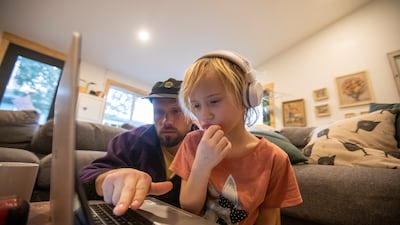I grew up in a tech-savvy family. My father was an avid gadget collector, and we children were encouraged to embrace the rapidly expanding digital world of the 1990s. As youngsters, my elder brother and I would disassemble video game consoles, fascinated by their inner workings. Unfortunately, we weren't always able to reassemble them. I learnt early on that digital technology is complicated, as is our evolving relationship with it.
The complex nature of society's relationship with digital technology has come to the forefront in recent years. There is a growing realisation that while tech is a powerful driver of human development, progress and positive social change, it also has a troubling shadow side – one we can't afford to ignore.
In 2019, after decades of research and debate, the World Health Organisation finally recognised "gaming disorder" within its official diagnostic system, classing it as a behavioural addiction. The same year, several pieces of tech-related legislation, notably the Social Media Addiction Reduction Technology (Smart) Act and the Filter Bubble Transparency Act, were presented to the US Senate. These proposed bills, that are still under consideration, aim to regulate social media platforms with the public interest and mental health in mind. In 2019, the Chinese government introduced a screen-time law prohibiting minors from gaming between 10pm and 8am.
This was all before Covid-19 hit. During the pandemic, tech was partially redeemed; it was at the heart of us "being together apart". Technology enabled society to keep going; education, business, and government services all continued to function to some extent. I was part of the team preparing the Saudi pavilion for Expo 2020 Dubai at that time. Tech allowed us to continue working through the pandemic, and the show went on.
However, after the pandemic, tech has increasingly been back in the firing line. Earlier this year, for example, executives from TikTok, Meta, Snap, X (formerly known as Twitter), and Discord were summoned to testify before the US Congress. The platforms in question have all been accused of facilitating child exploitation.
The trickle of tech criticism has become a torrent, with the term “techlash” increasingly used to describe the public's growing negative sentiment towards large technology companies. Much of this criticism is warranted, and some of the incidents behind the criticism are beyond tragic, such as the 2017 case of Molly Russell, a 14-year-old British schoolgirl who died during what a coroner called “an act of self-harm while suffering from depression and the negative effects of online content”.
Although much of this techlash is merited, some of it is also ill-founded, alarmist and unsubstantiated. For all its flaws and occasional gaping imperfections, digital technology makes lives easier and, in some instances, it saves lives. Unsurprisingly, there are calls to enshrine "access to the Internet" as a universal human right.
In this paradoxical (tech helps us, tech harms us) context, the King Abdulaziz Centre for World Culture (Ithra) launched its digital well-being programme, Sync. Committed to promoting digital well-being globally, Sync explores technology's positive and negative effects on physical, psychological and social health.

To date, working with international partners, Sync has taken a pioneering role in raising awareness about this issue through initiatives such as the Digital Well-being Summit, an event previously hailed as the "Davos of digital well-being". The next summit is slated for May this year in Dhahran, Saudi Arabia.
Launched last month on February 26, one of our most ambitious projects to date is the Global Digital Well-being Index. The first of its kind, the index allows us to look at country-level performance on digital well-being. It provides a constructive tool for anybody concerned about technology's impact on society.
Last year, we conducted an extensive digital well-being survey, spanning 35 nations and including 35,000 adult participants. The results provided valuable insights such as current attitudes towards generative AI, remote working, social media, gaming and more. The survey's findings, extensive policy analyses and numerous other data sources were all expertly combined to create our index.
The index was an international and multidisciplinary effort involving former index builders, economists, psychologists and data scientists. The result is a global compilation examining how well nations perform on a broad and inclusive definition of digital well-being.
Based on two complementary components, the index is a two-way street, looking at the extent to which nations capture the opportunities that the digital world provides while also exploring how well each nation manages or mitigates the negative effects of tech.
The capturing opportunities side includes a focus on things like levels of connectivity, the availability of digital education, and access to entertainment and culture. On the negative impact side, the focus is on the extent to which nations manage issues like problematic technology use, cyberbullying and online misinformation.
Canada, Australia and Singapore occupy the top three spots, performing best overall. The UAE is the highest-ranked Mena nation, and both Saudi Arabia and the UAE do exceptionally well on the capturing opportunities side of the index.
No country, however, has all the answers or faces all the challenges. The areas of excellence and the pain points are broadly distributed across the whole 35-country sample. For example, the Arab Gulf nations excel in connectivity, while the South-East Asian countries lead the way in digital education.
The main focus of the index isn't the rankings; it is to identify and share best practices, helping to drive broad progress across all nations. This tool can help decision-makers and those involved in policy development better protect and promote the digital well-being of the people they serve. It also establishes benchmarks against which targets can be set, and progress measured.
Several nations already have excellent initiatives; for example, Singapore's DQ Institute pioneered online child safety. Similarly, the Abu Dhabi Early Childhood Authority has launched several excellent initiatives promoting the digital well-being of children and families. Optimising digital technology's opportunities while simultaneously promoting well-being requires collaborative international effort. Our Index is only the latest contribution to this critical mission.


